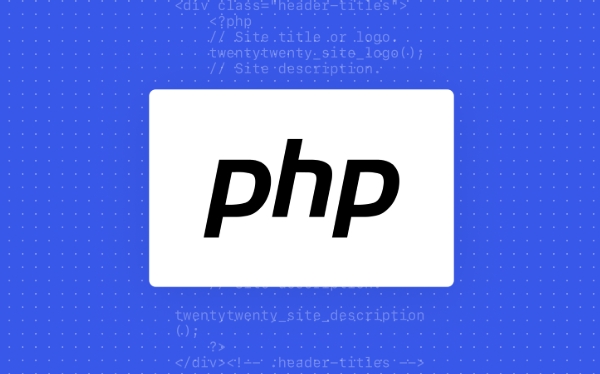 Backend Development
Backend Development
 PHP Tutorial
PHP Tutorial
 Capturing by Reference: Unlocking Mutable State in PHP Closures
Capturing by Reference: Unlocking Mutable State in PHP Closures
Capturing by Reference: Unlocking Mutable State in PHP Closures
Jul 29, 2025 am 04:17 AMCapturing variables by reference in PHP closures allows the closure to modify external variables from the parent scope, achieved using the & symbol in the use clause; 2. This enables mutable state within closures, making them suitable for counters, accumulators, shared context in callbacks, and pipeline stages; 3. A common pitfall is unintended side effects when multiple closures share the same referenced variable; 4. Loop-related issues occur when closures capture loop variables by reference, causing all closures to reflect the final value, which can be fixed by using value capture or isolating the variable per iteration; 5. Best practice is to use reference capture only when necessary, preferring value capture for safer and more predictable code.

When working with closures in PHP, one of the more subtle but powerful features is capturing variables by reference. This allows closures to not just read, but actually modify external variables from their defining scope — even after that scope has otherwise finished executing. This capability unlocks mutable state in closures, making them far more flexible than simple anonymous functions.

Let’s break down how this works and why it matters.
What Is Variable Capture in PHP Closures?
In PHP, when you define a closure (an anonymous function), it can "capture" variables from the parent scope using the use keyword.

By default, these variables are captured by value, meaning the closure gets a copy:
$counter = 0;
$increment = function () use ($counter) {
$counter ;
};
$increment();
echo $counter; // Still 0 — the closure modified its own copyBut if you want the closure to actually affect the original variable, you need to capture it by reference, using the & symbol:

$counter = 0;
$increment = function () use (&$counter) {
$counter ;
};
$increment();
echo $counter; // Now outputs 1 — the original was modifiedThis small change makes a big difference: the closure now shares access to the same variable, not a copy.
Why Mutating Captured State Matters
Capturing by reference enables closures to maintain and modify mutable state, which is essential for patterns like:
- Counters and accumulators
- Callbacks that need to track progress
- Event handlers with shared context
- Deferred computations that depend on changing data
For example, imagine processing a list of items and wanting to log how many succeeded:
$successCount = 0;
$errorLog = [];
$processItem = function ($item) use (&$successCount, &$errorLog) {
if (rand(0, 1)) {
$successCount ;
} else {
$errorLog[] = "Failed processing {$item}";
}
};
array_map($processItem, ['A', 'B', 'C', 'D']);
echo "Successes: $successCount\n"; // e.g., Successes: 2
print_r($errorLog);Without references, $successCount and $errorLog would remain unchanged outside the closure.
Common Pitfalls and Best Practices
While powerful, capturing by reference can make code harder to reason about if overused. Here are a few things to watch out for:
Unintended side effects: If multiple closures share a reference, changing it in one affects all.
$value = 10; $add5 = function () use (&$value) { $value = 5; }; $subtract3 = function () use (&$value) { $value -= 3; }; $add5(); $subtract3(); echo $value; // 12Timing issues: The closure sees the current value of the variable when it runs, not when it was defined. This is especially important in loops.
?? This common mistake doesn't work as expected:
$functions = []; for ($i = 0; $i < 3; $i ) { $functions[] = function () use (&$i) { echo $i . "\n"; }; } // All closures output 3, because $i is 3 after the loop? Fix: bind each value separately:
for ($i = 0; $i < 3; $i ) { $functions[] = function () use ($i) { echo $i . "\n"; }; // by value }Or, if you need reference behavior per iteration, copy into a local:
for ($i = 0; $i < 3; $i ) { $index = $i; $functions[] = function () use (&$index) { echo $index . "\n"; }; }
Real-World Use Case: Middleware or Pipeline Stages
A practical example is building a pipeline where each stage modifies a shared context:
$context = ['data' => 'start', 'processed' => false];
$stages = [
function () use (&$context) {
$context['data'] .= ' -> validated';
},
function () use (&$context) {
$context['processed'] = true;
$context['data'] .= ' -> transformed';
},
function () use (&$context) {
$context['data'] .= ' -> logged';
}
];
foreach ($stages as $stage) {
$stage();
}
print_r($context);
// Output:
// Array
// (
// [data] => start -> validated -> transformed -> logged
// [processed] => 1
// )This pattern is common in frameworks, testing utilities, or configuration builders.
Capturing by reference in PHP closures isn’t just a syntax trick — it’s a way to create stateful, cooperative functions that can evolve shared data over time. Used wisely, it makes closures a powerful tool for encapsulating logic that needs to remember or influence its environment.
Just remember: with great power comes great responsibility. Always ask: Does this closure really need to mutate the outer variable? If not, stick to value capture for safer, more predictable code.
Basically, it's not complex — but it's easy to misuse.
The above is the detailed content of Capturing by Reference: Unlocking Mutable State in PHP Closures. For more information, please follow other related articles on the PHP Chinese website!

Hot AI Tools

Undress AI Tool
Undress images for free

Undresser.AI Undress
AI-powered app for creating realistic nude photos

AI Clothes Remover
Online AI tool for removing clothes from photos.

Clothoff.io
AI clothes remover

Video Face Swap
Swap faces in any video effortlessly with our completely free AI face swap tool!

Hot Article

Hot Tools

Notepad++7.3.1
Easy-to-use and free code editor

SublimeText3 Chinese version
Chinese version, very easy to use

Zend Studio 13.0.1
Powerful PHP integrated development environment

Dreamweaver CS6
Visual web development tools

SublimeText3 Mac version
God-level code editing software (SublimeText3)
 The Omnipresent Scope: A Practical Guide to PHP's Superglobals
Jul 26, 2025 am 09:47 AM
The Omnipresent Scope: A Practical Guide to PHP's Superglobals
Jul 26, 2025 am 09:47 AM
PHP's hyperglobal variables are always available built-in arrays used to process request data, manage state and obtain server information; 1. When using $_GET, URL parameters need to be type-converted and verified; 2. When receiving form data through $_POST, filtering should be performed with filter_input(); 3. Avoid using $_REQUEST to prevent security vulnerabilities; 4. $_SESSION needs to call session_start() and log in to reset the session ID; 5. When setting $_COOKIE, enable secure, httponly and samesite attributes; 6. The information in $_SERVER cannot be fully trusted and cannot be used for security verification; 7.$_ENV may be
 Navigating the Boundaries: A Deep Dive into Local and Global Scope
Jul 26, 2025 am 09:38 AM
Navigating the Boundaries: A Deep Dive into Local and Global Scope
Jul 26, 2025 am 09:38 AM
Thedifferencebetweenlocalandglobalscopeliesinwherevariablesaredeclaredandaccessible:globalvariablesaredefinedoutsidefunctionsandaccessibleeverywhere,whilelocalvariablesaredeclaredinsidefunctionsandonlyaccessiblewithinthem.1.Globalscopeallowsbroadacce
 Mastering Lexical Scoping: The `use` Keyword and PHP Anonymous Functions
Jul 25, 2025 am 11:05 AM
Mastering Lexical Scoping: The `use` Keyword and PHP Anonymous Functions
Jul 25, 2025 am 11:05 AM
In PHP, if you want to use external variables in anonymous functions, you must explicitly import them through the use keyword; 1. Use is used to introduce external variables into the lexical scope of the closure; 2. Pass variables by default by value, and pass them by reference with &$var syntax; 3. Multiple variables can be imported, separated by commas; 4. The value of the variable is captured when the closure is defined, not when it is executed; 5. Each iteration in the loop creates an independent closure copy to ensure that the variable value is correctly captured; therefore, use is a key mechanism to achieve the interaction between the closure and the external environment, making the code more flexible and controllable.
 Demystifying Global Access: `global` Keyword vs. the `$GLOBALS` Array
Jul 25, 2025 am 05:27 AM
Demystifying Global Access: `global` Keyword vs. the `$GLOBALS` Array
Jul 25, 2025 am 05:27 AM
ThetwomaintoolsforaccessingglobalvariablesinPHParetheglobalkeywordandthe$GLOBALSsuperglobalarray;1)Theglobalkeywordcreatesareferencetoaglobalvariableinsideafunction,allowingdirectaccessandmodification,andifthevariableisundefined,itinitializesitasnull
 The Scope Resolution Order: How PHP Finds Your Variables
Jul 25, 2025 pm 12:14 PM
The Scope Resolution Order: How PHP Finds Your Variables
Jul 25, 2025 pm 12:14 PM
PHPresolvesvariablesinaspecificorder:1.Localscopewithinthecurrentfunction,2.Functionparameters,3.Variablesimportedviauseinclosures,4.Globalscopeonlyifexplicitlydeclaredwithglobaloraccessedthrough$GLOBALS,5.Superglobalslike$_SESSIONand$_POSTwhichareal
 Scope Implications of Generators and the `yield` Keyword
Jul 25, 2025 am 04:45 AM
Scope Implications of Generators and the `yield` Keyword
Jul 25, 2025 am 04:45 AM
Functions using yield will become generators, and when called, they return the generator object instead of being executed immediately; 2. Local variables of the generator will not be destroyed during the yield pause, but will continue to exist with the generator frame until the generator is exhausted or closed; 3. Extended variable life cycle may lead to an increase in memory usage, especially when referring to large objects; 4. When combined with closures, LEGB rules are still followed, but the latebinding problem of looping variables needs to be solved by immediately binding (such as the default parameter value); 5. .close() should be called explicitly to ensure that finally block execution is performed to avoid delays in resource cleaning. The generator affects memory and behavior by extending the survival time of variables, but does not change the lexical scope rules.
 Why Your Variables Disappear: A Practical Guide to Scope Puzzles
Jul 24, 2025 pm 07:37 PM
Why Your Variables Disappear: A Practical Guide to Scope Puzzles
Jul 24, 2025 pm 07:37 PM
Variablesdisappearduetoscoperules—wherethey’redeclareddetermineswheretheycanbeaccessed;2.Accidentalglobalcreationoccurswhenomittingvar/let/const,whilestrictmodepreventsthisbythrowingerrors;3.Blockscopeconfusionarisesbecausevarisfunction-scoped,unlike
 The `global` Keyword: A Double-Edged Sword in PHP Scope Management
Jul 25, 2025 pm 05:37 PM
The `global` Keyword: A Double-Edged Sword in PHP Scope Management
Jul 25, 2025 pm 05:37 PM
TheglobalkeywordinPHPallowsfunctionstoaccessvariablesfromtheglobalscope,butitshouldbeusedsparinglyduetosignificantdrawbacks.1)Itenablesquickaccesstoconfigurationvaluesinsmallorlegacyscripts.2)ItfitsproceduralcodebaseslikeolderWordPresspluginswheredep





